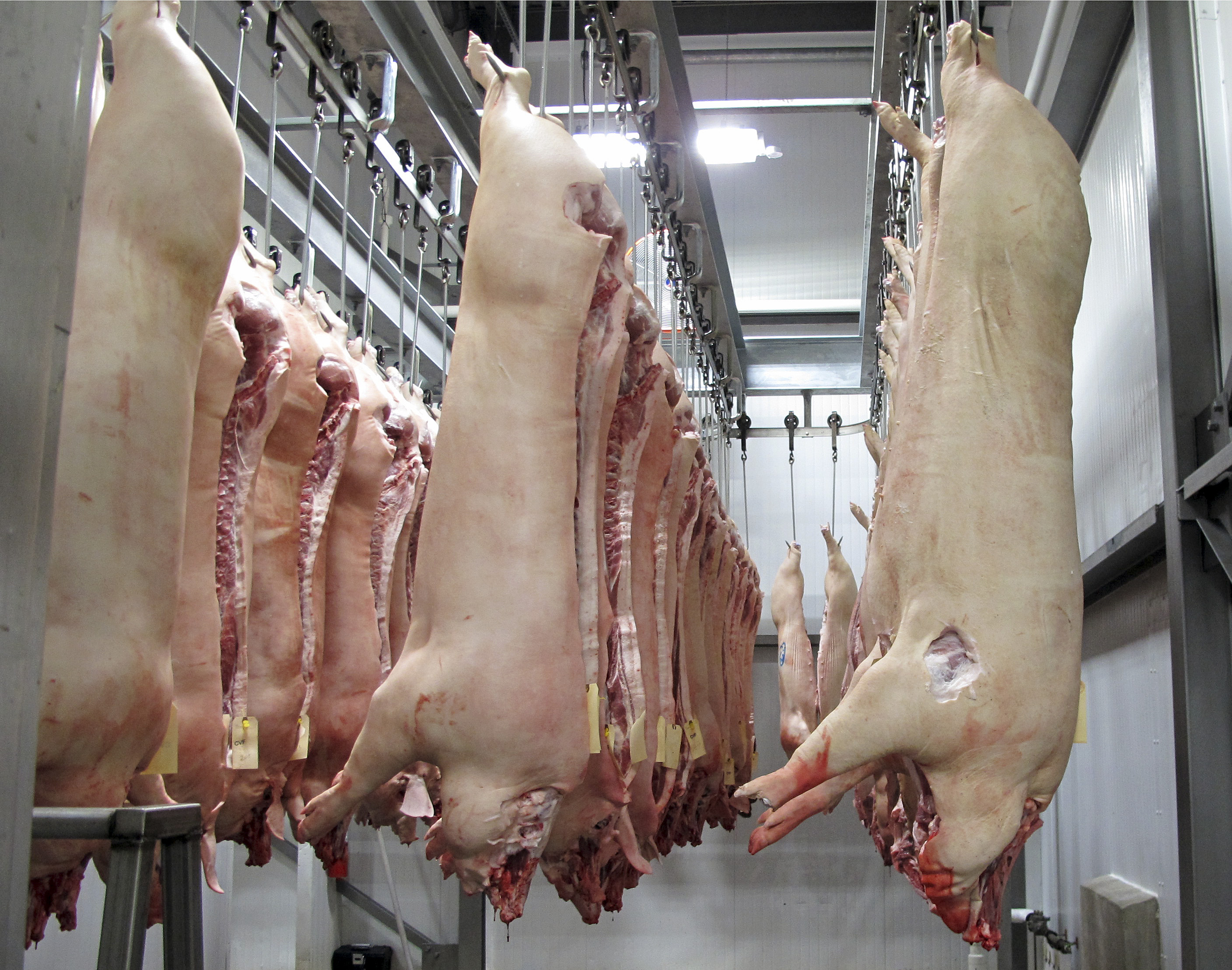Report Details Filthy Conditions in U.S. Meat Plants
The Guardian uncovers records of incidents like chicken being rinsed off after falling on the floor, bloody standing water from drains blocked with meat parts—and much worse. Hogs at a Vermont slaughterhouse in 2016. (Lisa Rathke / AP)
Hogs at a Vermont slaughterhouse in 2016. (Lisa Rathke / AP)
Unpublished U.S. government records obtained in a journalistic investigation describe filthy conditions at American meat plants, according to an article this week in the British newspaper The Guardian. The investigation was conducted by the Bureau of Investigative Journalism, which is a London-based nonprofit organization, and The Guardian.
Some of the meat was found to be covered in fecal matter and “abscesses filled with pus.” The report also told of chicken being dropped on the floor and then being rinsed with diluted chlorine and allowed back on the production line. Some of the factories had floors flooded with dirty water due to drains being blocked by meat parts and other debris.
The Guardian reports:
In one incident, diseased meat – condemned from entering the human food chain – was placed in a container meant for edible product. An inspector discovered “carcasses of poultry showing evidence of septicemic disease … carcasses showing evidence of having died from other causes than slaughter … guts of carcasses, [and] poultry carcasses with heads attached.” He requested that the condemned items be removed. A similar incident was recorded some days later.
One inspector saw chicken drumsticks piling up on the floor, and instructed workers to pick them up “to be reconditioned with chlorinated water.” Again, a similar incident had occurred previously. In another incident in a bagging department, 36 shrink-wrapped whole birds were found scattered on the floor. An inspector noted: “in my presence the establishments began initiating their corrective action by picking up all affected product off the floor … to be carried to the establishment’s designated wash station to be thoroughly rinsed off.”
Meat soiled with faecal matter was also recorded, with an inspector noting “… I observed a poultry intestine in the liver bin. The intestine was approximately 6.5 inches long and had visible faeces oozing out both ends.” The incident resulted in the livers being condemned from the human food chain.
At another Pilgrim’s Pride plant, the records reveal how deficient equipment led to a carcass becoming contaminated with faeces. “I observed one of my 10 test birds with a spot of faecal matter on the exterior of the right thigh. The spot of faecal [sic] was … brownish green in colour and had a pasty consistency,” an inspector notes. The affected bird was “retained by management for review then sent to reprocessing for reconditioning with chlorinated water.” Similar carcass contamination had been recorded before.
Internal FSIS records also highlight numerous violations at meat plants producing pork. In an incident recorded at a plant run by Swift Pork, owned by meat giant JBS, 48 pig carcasses were found to have fallen on the floor because of defective equipment, leading to contamination with “black trolley grease, floor grime and bloody smears”. The records noted: “The line was stopped for about 15 minutes. The carcasses were sent to be trimmed first then steam vacuumed with 180F water.”
On another occasion, an employee cleaned the factory floor with meat products on an adjacent conveyor belt, creating a mist that could contaminate the meat. “This mist is contaminated by the inedible debris and … comes into contact with edible product,” an inspector observed. In a separate incident, a pig’s head was found to have partially covered a drain, leading to “bloody waste water filling the area”. This and another blockage caused by a buildup of skin led to dirty water flooding other areas. “Because of the plugged drains, an insanitary condition was created; the bloody water in the walkway could be splashed and carried throughout the kill floor after employees walked through the puddle,” an inspector wrote.
In a different part of the factory, inspectors found a stainless steel handwash sink “plugged and approximately one-quarter full of standing bloody water with pieces of fat and meat. Production employees use this sink to clean and sanitise their hands and gloves. This creates an insanitary condition.”
A statement by JBS, owner of Pilgrim’s Pride and Swift Pork, said the violations were “immediately addressed.” It added, “None of these incidents put anyone at risk or resulted in any adulterated product released into commerce. Food safety is achieved by implementing processes that consistently detect and correct issues before products are released into commerce.”
Over 16,000 noncompliance reports on Pilgrim’s Pride operations found 36,612 regulatory violations at 24 plants during a 25-month period between 2014 and 2016, the investigators said.
Meat hygiene inspectors were quoted as saying it is inevitable that bad practices will occur when production speed takes priority over cleanliness.
The problem is not confined to the United States. Although the United Kingdom is considered to have stricter food safety and regulation, more than half of all audited plants in the U.K. were found to have at least one major breach in the past three years, with an average of 16 major failings per week. According to The Guardian, almost two-thirds of audited meat in England, Wales and Northern Ireland was in violation of safety rules.
In the midst of these revelations, Kath Dalmeny, CEO of Sustain, a group seeking better food and farming practices, told The Guardian that the British government has been slashing the budget for policing the food system over the past decade and that officials “doggedly insist on pursuing the flawed notion that light-touch regulation is good enough for the meat industry.” Now that Brexit is underway, new trade deals between the U.S. and the U.K. are beginning to form. According to Dalmeny, the U.S. told the United Kingdom that British food standards would need to be lowered “in exchange for a quick trade deal.”
The U.S. has a legal loophole that allows meat infected with salmonella to be sold in human supply chains. In the U.S., salmonella causes 1 million illnesses per year.
According to the Centers for Disease Control and Prevention, 128,000 people are hospitalized and 3,000 die each year due to foodborne diseases. Contaminated food sickens one in six Americans annually.
Your support matters…Independent journalism is under threat and overshadowed by heavily funded mainstream media.
You can help level the playing field. Become a member.
Your tax-deductible contribution keeps us digging beneath the headlines to give you thought-provoking, investigative reporting and analysis that unearths what's really happening- without compromise.
Give today to support our courageous, independent journalists.






You need to be a supporter to comment.
There are currently no responses to this article.
Be the first to respond.